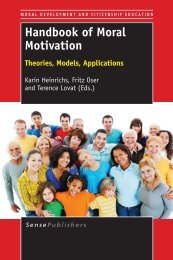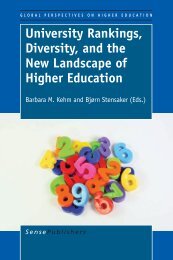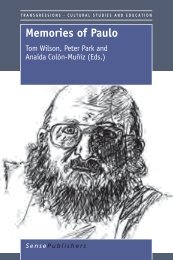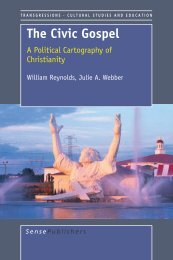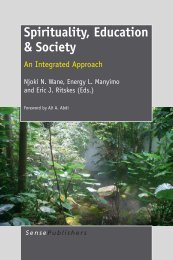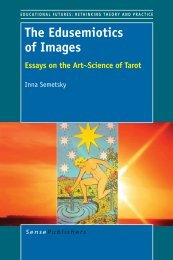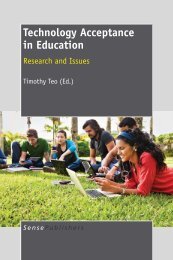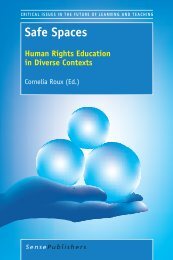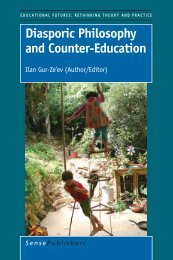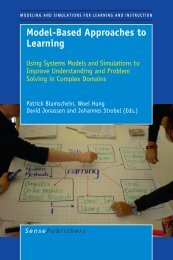Rupturing Concepts of Disability and Inclusion
Rupturing Concepts of Disability and Inclusion
Rupturing Concepts of Disability and Inclusion
You also want an ePaper? Increase the reach of your titles
YUMPU automatically turns print PDFs into web optimized ePapers that Google loves.
CHAPTER 2<br />
18<br />
Whilst this passage refers to disabled men, women, as ‘non-men’, are<br />
disabled by nature in this kind <strong>of</strong> thinking. Disabilities in men cannot totally<br />
eradicate their rights as males, but they are severely curtailed at least in<br />
matters <strong>of</strong> holiness. In the paradigm <strong>of</strong> male honor <strong>and</strong> shame, being less<br />
63<br />
than fully male is certain cause for self-loathing.<br />
5 The Disabled as Objects <strong>of</strong> Divine Action – The dignity <strong>of</strong> the disabled <strong>and</strong> their<br />
status as potentially valued members <strong>of</strong> their societies is directly challenged by<br />
the Bible’s continuous portrayal <strong>of</strong> them as objects <strong>of</strong> divine action. They are<br />
presented as ‘plot-devices’ that show <strong>of</strong>f the power <strong>of</strong> God or the Anointed One;<br />
however, if the healing fails to materialise, they are viewed negatively <strong>and</strong> seen<br />
as agents <strong>of</strong> sin. For those whose physical conditions are not likely to improve,<br />
the questions <strong>of</strong> faith <strong>and</strong> personal meaning raised by the Bible’s continued<br />
stress on the disabled/ill person as one in the state <strong>of</strong> awaiting divine healing can<br />
demoralise <strong>and</strong> disempower rather than provide a means <strong>of</strong> continued growth. 64<br />
In her theological examination, Avi Rose also finds similar attitudes towards<br />
those with disabilities. Rose categorises them “under four general headings, which<br />
together can be seen to form the basis <strong>of</strong> many beliefs within organised Western<br />
religion.” 65 According to Rose, these are:<br />
1. disability as a sign <strong>of</strong> punishment or evil incarnation;<br />
2. disability as challenge to divine perfection;<br />
3. disability as object <strong>of</strong> pity <strong>and</strong> charity; <strong>and</strong><br />
4. disability as incompetence <strong>and</strong> exemption from religious practice. 66<br />
Henri-Jacques Stiker, who surveys the Bible for notions <strong>of</strong> ‘infirmity’ as well,<br />
draws similar conclusions to Fontaine <strong>and</strong> Rose. He highlights the notions <strong>of</strong><br />
legal, cultural <strong>and</strong> sacral impurity that linked people with disability in the Biblical<br />
texts to identities <strong>of</strong> difference <strong>and</strong> pr<strong>of</strong>anity, <strong>and</strong> to positions <strong>of</strong> segregation <strong>and</strong><br />
exclusion. 68 Stiker also makes some illuminating comments about an implicit<br />
denunciation <strong>of</strong> violence towards the ‘unfortunate <strong>and</strong> disfigured’. He contends<br />
that it seems to be the case that the Hebrew biblical texts <strong>of</strong> the Old Testament<br />
reveal deep-seated violence towards disability <strong>and</strong> physical or mental misfortune in<br />
as much as the person struck down by misfortune is expected to play the role <strong>of</strong> the<br />
scapegoat in carrying the burden <strong>of</strong> sin <strong>and</strong> the burden <strong>of</strong> evil. 69 However, this is<br />
not what develops. Instead, there is the imperative for social responsibility. Stiker<br />
outlines how the Hebrew Scriptures do not promote violence <strong>of</strong> a sacred <strong>and</strong><br />
religious nature, but rather promote ethics <strong>of</strong> a social nature so as to not<br />
‘contaminate’ the divine with sacrifices <strong>of</strong> ‘abnormal’ beings. The existence <strong>of</strong><br />
abnormal deviants as representations <strong>of</strong> evil are seen to result from the sinfulness<br />
<strong>of</strong> the human domain, thus requiring moral considerations. 70 New Testament texts<br />
present a different picture due to the actions <strong>of</strong> Jesus <strong>of</strong> Nazareth, who, without<br />
denying the overarching link between evil/misfortune <strong>and</strong> sin, breaks the link<br />
between disability <strong>and</strong> individual guilt by redefining evil not as external blemishes,<br />
but rather as the way one behaves towards others. Therefore, ethics is no longer<br />
just the consequence <strong>of</strong> the sacred order <strong>of</strong> things, but comes to be its foundation. 71<br />
These different beliefs would evoke different practices. This research will show<br />
that Christian churches have emphatically influenced historical underst<strong>and</strong>ings <strong>and</strong><br />
67




